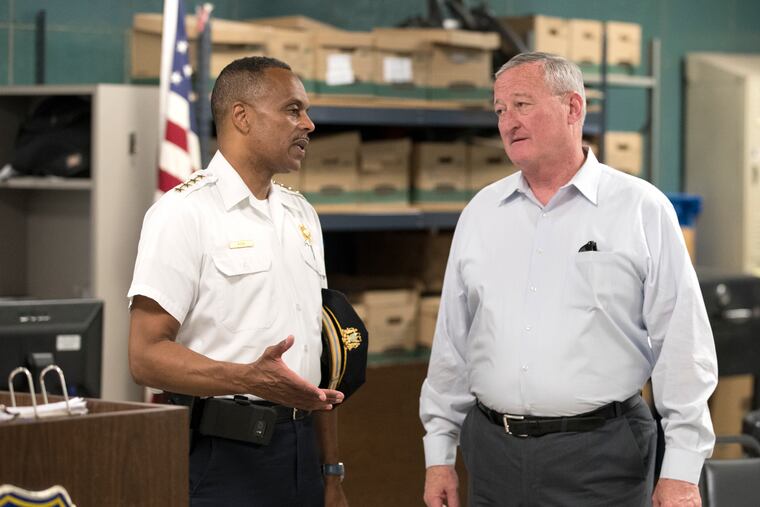Philly Police: 72 officers are off street duty. What’s next? | Opinion
Suspensions and firings are not a long-term plan that will benefit civilians and officers.

There is considerable outrage over the Philadelphia police officers accused of racist and Islamophobic Facebook posts, since the Plain View Project reported findings on officers’ social media use this month.
At this time, 72 of the 330 officers who posted have been taken off street duty by the department.
I attended the first protest against these officers and the Police Department held in front of the Roundhouse, and a City Council hearing that touched on the issue. What I heard and saw were great one-liners, creative chants, awesome public speaking, and raw passion. What I didn’t see was a plan of action that people could get behind and support. I heard an incredible amount of anger and emotion expressed by those in attendance — absent a detailed strategy.
As a city, let’s step back for a moment and view the situation dispassionately. Are members of the black, Islamic, and immigrant communities surprised by the Facebook revelations? We have lived in the shadow of racist or otherwise questionable Philadelphia Police Department actions for decades. From 2009 to 2014 alone, the city paid out $40 million in police misconduct suits, including more than $13 million for excessive force.
Philly’s long history with these incidents reflects how widespread the problem is — and why suspending 72 officers won’t solve it. At some point in this process, there must be firings of those responsible for the most bigoted posts, such as those advocating harm of civilians, to make clear that this level of racism will not be tolerated. But how many officers whose prejudice wasn’t “caught” on Facebook will that leave?
Consider that the Philadelphia Police Department has around 6,300 sworn members and 800 civilian personnel. The 330 officers exposed by their posts are only part of a larger problematic culture that must be addressed. That starts with changes in leadership. A police inspector, six captains, and eight lieutenants shared bigoted posts, according to Plain View. Removing 72 officers from street duty doesn’t address bigotry inside departmental offices.
The department should set clear standards of behavior. Violating these standards should result in dismissal, heavy fines, seizure of pensions or benefits, and criminal prosecution where appropriate, such as unwarranted physical attacks on civilians.
The POWER Live Free Campaign, Solomon Jones, and community activists are pushing this envelope through their demands of the mayor and police commissioner for accountability and action.
It is possible to get sidetracked by anger, infuriated by the white supremacist language and tone of the Facebook posts. It is more difficult to focus on comprehensive strategies with short- and long-term goals. We must avoid settling for one-offs, such as suspending or firing some officers, ignoring the larger implications, and then dropping this issue.
Our city is once again confronting long-term challenges to promoting safety and fair law enforcement: What is the path to better community policing? How can we change the culture of the police so that rank and file police see the community as their own? How do we get the community to buy into change, and believe that every person wearing a uniform is not an enemy? How can citizens be engaged in innovative strategies that will begin to rebuild trust that has been sorely taxed by the current outrage? Will mass firings increase frustration among officers themselves, and simply drive racism deeper underground by encouraging officers to keep their prejudice off social media. How will the police officers’ families and communities be impacted financially and socially by mass firings?
A range of community groups must work together — alongside the department and Mayor Jim Kenney — to solve this problem, not just the black, Islamic, and immigrant populations most impacted. Those whose socioeconomic status typically protects them from racist police action must still be part of this process. However, it should be led by those who are most impacted — black communities and other communities of color. As a city we must work together to wipe this racist stain from Philadelphia and seek to build a better collective future.
J. Jondhi Harrell is a community activist, political consultant, and Rastafarian Quaker dedicated to criminal justice reform and building community. His organization TCRC Philly is opening a Community Healing & Transformation Center July 15 in North Philadelphia. (tcrcphilly.org)